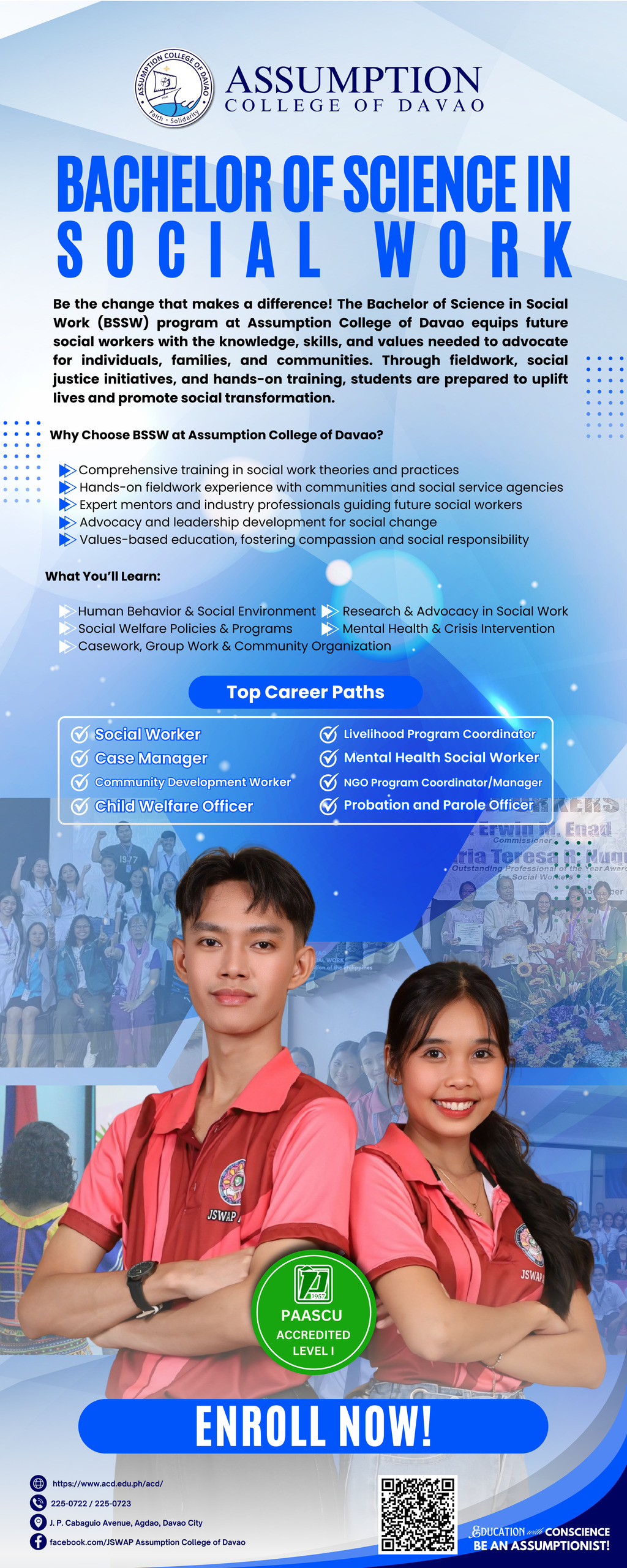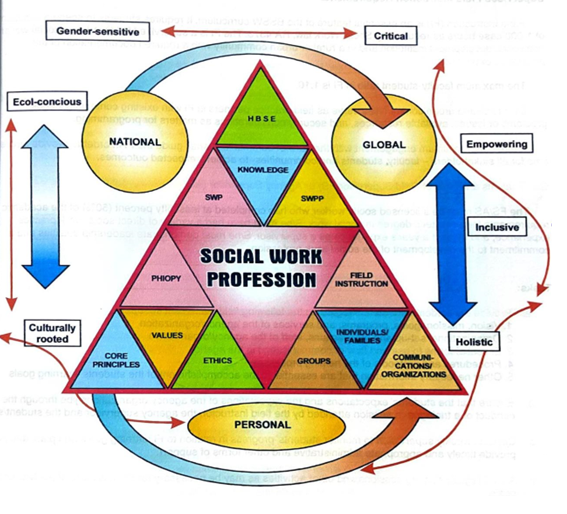Latest Post
ABOUT THE PROGRAM
Social Work Global Definition
“Social work is a practice-based profession and an academic discipline that promotes social change and development, social cohesion, and the empowerment and liberation of people. Principles of social justice, human rights, collective responsibility, and respect for diversity are central to social work. Underpinned by theories of social work, social sciences, humanities, and indigenous knowledge, social work engages people and structures to address life challenges and enhance wellbeing.” (International Federation of Social Workers)

Legal Basis of Social Work in the Philippines
Republic Act 4373 otherwise known as the “Social Work Law” was approved on June 19, 1965 – “An Act to Regulate the Practice of Social Work and the Operation of Social Work Agencies in the Philippines and for Other Purposes”.
Social Work Program Description
Professional education in Social Work requires the acquisition and application of a beginning level of knowledge, attitudes, values, and skills in enhancing the social functioning of individuals, families, groups, and communities, linking people (client systems) with needed resources, improving the operation of social service delivery networks, and promoting social justice through advocating for just social policies.
The BSSW curriculum must emphasize the integrative character of social work within the context of a micro-macro practice continuum focusing on human development and social transformation, possessing such attributes as cultural and gender sensitivity, rights context, and evidence-based, critical-reflective thinking, emphasizing client empowerment, and demonstrating competence in assuming a wide range of professional roles.
Competency Standards
As emphasized in the new BSSW curriculum, the Assumption College of Davao supports the following standards-based on global regulations with due special reference to the Philippine context:
- Knowledge of and skills in the generalist helping process and planned change process within the micro-meso-macro practice continuum for the purposes of developmental, protective, preventive, and/or therapeutic intervention.
- A critical understanding of social work origin, development, and purposes unique to the Philippine experience.
- A critical understanding of how global and national socio-structural inadequacies, discrimination, oppression, and socio-economic and political injustice impact human functioning and development.
- Knowledge of human behavior and the social environment, with particular emphasis on the person-in-environment transaction, life span development, and the interaction among biological, psychological, socio-structural, gender, cultural, and spiritual factors in shaping human development and behavior.
- Knowledge of social welfare policies, programs, and services of the locality, country and/or region.
- Knowledge of, and skills in social work research, including ethical use of research, traditional local positivism and alternative research paradigms, and critical appreciation of the use of research in social work practice.
- Sufficient knowledge of related occupations and professions and ability to work with multi-disciplinary/interdisciplinary/transdisciplinary teams to facilitate inter-professional collaboration and teamwork.
- The development of critical self-reflective and ethically active practitioners.
- Ability to practice in various contexts, e.g., respect for diverse ethnic and cultural groups, including those with special needs.
- Ability to network, mobilize resources and develop partnerships.
- Ability to use supervision for personal and professional growth.
- Application of social work values, ethical principles, knowledge and skills to address and transform social inequities.

Transition to the OBE Standards of Social Work Education
As the world state of the economy, social, political, cultural, and educational landscape continues to adjust to the increasing challenges in keeping pace with the demands of a fast-changing technological development driven by neoliberal globalization of the powerful western economies, we see the Asian region including the Philippines grappling with the transition to this new educational philosophy, the Outcomes-Based Education.
Outcomes-Based Education (OBE) is the educational system preparing students to meet the highest standards of a particular profession. The OBE is education in which an emphasis is placed on a clearly articulated idea of what students are expected to know and be able to do, that is, what skills and knowledge they need to have, when they leave the school system.
CMO 46 series of 2012 on the Policy and Standard to Enhance Quality Assurance (QA) in Philippine Higher Education through Outcomes-Based and Typology-Based QA, encouraged all Philippine higher education institutes to implement OBE not only to be locally and globally competitive but also to work for transformative education. It mandated all institutions of higher learning to adopt an outcomes-based approach to teaching and learning.
The shift towards OBE in the Philippines is influenced by a number of factors. First, there is a growing international trend in the adoption of outcome-based education as a framework for ensuring the alignment of the curriculum, instruction and assessment to enable graduates to attain degree level expectations. Second, the concept of borderless and seamless education has gained wider acceptance among educational institutions due to globalization. Third, industry, workplace and stakeholder expectations propel academic institutions to graduate professionals who can be locally and globally competitive and who can contribute to local, national and global development. Fourth, graduates who are equipped with competencies at par with international standards are most likely to succeed in their professional practice and demonstrate greater global mobility. Finally, OBE stems from the need to “establish national standards and levels for outcomes of education and training, skills and competencies” as stipulated in the Philippine Qualifications Framework.
Further, as cited by Custodio, P. et al. (2012) Outcome-Based Education (OBE) provides a framework for focusing and organizing the curriculum around predetermined and clearly defined student learning outcomes. It has been viewed as a significant paradigm shift in educational philosophy and practice which underscores a learning-based model focusing on what students know and can do as a result of a learning experience or acquiring a degree as opposed to a teacher centered model that emphasizes what is presented (Tam, 2014; Biggs, 2014). “OBE has two requirements. First, that the learning outcomes are identified, made explicit and communicated to all concerned. Second, the educational outcomes should be the overriding issue in decisions about the curriculum.”(Morcke, Dornan & Eika, n.d.; Harden, 2009).
OBE-Based Institutional and Program Outcomes
The Assumption College of Davao implemented OBE in 2015, which led to the revision of all curricular programs offered by the Department, including Bachelor of Science in Social Work.
OBE Institutional Outcomes
Graduates of the Assumption College of Davao have the ability to:
- Live life as guided by the Catholic faith, show compassion towards others, devote time in prayer, and strive to live out the gospel values in everyday life; respect the presence of other faiths and strive for a constantly peaceful ecumenism and interfaith dialogue (Faith Motivated);
- Maintain one’s interrelation with the whole of God’s creation and respond actively to the call of being a virtuous steward of God’s handiwork (Creation-Centered);
- Demonstrate social awareness, participate in mobilizations concerning social issues and events, and involve actively in organizations that work for social transformation (Socially Concerned and Involved);
- Demonstrate strong nationalism and pro-Filipino stance on the side of the poor, deprived, oppressed and struggling; promote national culture and identity of the indigenous people and the Bangsamoro (Nationalist, Pro-Filipino and Pro-Poor);
- Show respect in all beliefs and principles, as well as willingness to engage in any type of dialogue and conversations with people of different beliefs and persuasions; adaptable to new situations and experiences when learning (Flexible and Open-Minded);
- Respect all gender identities and expressions; appreciate, accept, and care about people of all sexual orientations, gender identities, and expressions; advocates women’s rights and the gender equality (Gender-Sensitive);
- Practice simplicity by living within their means; manifest hopefulness and joyfulness despite desperate situations (Simple, Hopeful and Joyful);
- Possess scientific and holistic consciousness and able to decide based on the rigors of research processes and interconnectedness of situations (Scientific and Holistic);
- Balance and analyze well situations and issues in order to form a better judgment and stance (Critical Thinker);
- Exhibit intense love to acquire knowledge through the rigors of theory and social practice and ascertain themselves information towards transformation (Intense Love For Study and Well-Informed);
- Adapt to new situations and technological environments with a positive attitude towards the use of ICT to support collaboration, learning and productivity (Information and Technology Competent);
- Manifest effective leadership towards societal transformation while fostering professionalism and encouraging synergy among teams and collaborations (Effective Leaders and Collaborators).
- All curricular programs then transitioned to the OBE framework. After series of consultations, orientation and training on the OBE, revision of all syllabi on general education and professional courses under the Social Work Program ensued pursuant to CMO 46 series of 2012.
